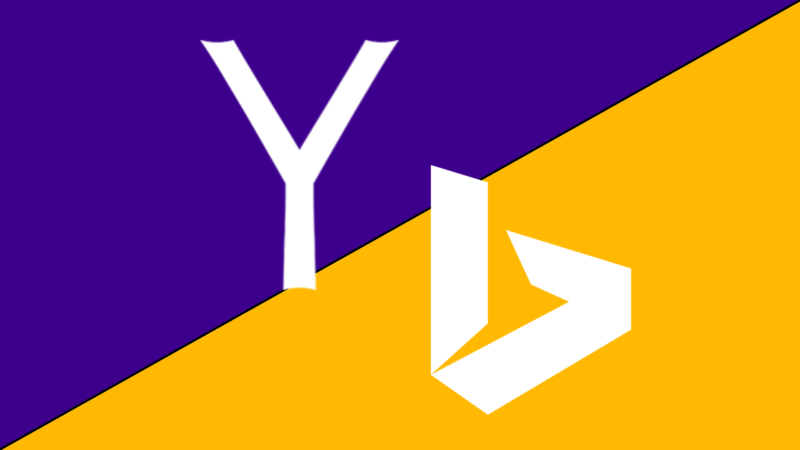Yahoo-Bing Reach New Search Deal; Yahoo Gains Right To Serve Search Ads On The PC
New terms pave the way for Gemini-powered search ads on the PC.

This morning Yahoo and Microsoft announced an amended search relationship. While it keeps the basic framework of the original deal in place it gives both companies, most notably Yahoo, more autonomy.
Under the old deal, Yahoo had to carry Microsoft’s Bing’ ads on desktop. On mobile, Yahoo had flexibility to sell as it likes. Over the past year, Yahoo has made great use of this by launching its Yahoo Gemini platform that allows a single place for advertisers to buy mobile search and native ads.
Now Yahoo has more flexibility on desktop. Under the new deal, 51% of its desktop search traffic has to carry Bing ads. The rest can carry ads however Yahoo likes — either from its own Gemini system or other partners.
The biggest likely external partner would be Google, which has expressed interest in the past. Google originally wanted to be Yahoo’s partner before a deal with Microsoft was put into place, but that idea came to a halt in 2008 after the US Justice department threatened antitrust action.
Yahoo told Search Engine Land that it is looking to likely extend Gemini to handle desktop search ads. As for partnering with Google, it’s possible but not something it wanted to speculate on.
There’s lots of “win-win” language in the Yahoo-Microsoft press release. However, Mayer had been unhappy with the deal she inherited and exploited areas where the contract was silent (e.g., mobile) to build a new search business and ads platform at the company (i.e., Gemini). Under the new deal, by the way, mobile is defined as both smartphone and tablet traffic.
Yahoo expressed optimism that the new deal would allow both companies to move ahead in a more positive yet competitive manner. Both Mayer and Microsoft CEO Satya Nadella had been working under a deal put in place by their predecessors. Now, they have a new deal they’ve both crafted with expectations they’ve directly agreed upon.
The announcement was silent about ad position or priority. It’s a safe bet that Gemini will expand to cover the PC as well. Will Yahoo favor its own ads on the PC? In other words, will there be designated Yahoo and Bing ad slots in Yahoo PC search results? How will Yahoo integrate and prioritize Bing Ads vs. Yahoo search ads on the PC?
The parties will also handle all their own ad sales. Previously Yahoo was handling so-called “premium search” sales for both companies. That will end. Premium search ad sales were sales to larger advertisers and brands. By comparison, smaller advertisers bought directly from Bing. SEM firms using Microsoft APIs also bought directly from Bing.
Yahoo explained in the release that revenue sharing and the “existing underlying economic structure [of the prior deal] remains unchanged.” Presumably that means that the major financial terms are not affected.
Bing will continue to provide the underlying non-paid search results and technology for Yahoo. In the old agreement, Yahoo gave up the technology it had for ten years and pretty much just mirrored Bing’s results with a Yahoo look-and-feel. But under the new agreement, it now has the flexibility to generate about half its results using its own technology or even to partner with someone else, if it wants. Bing just has to be used for 51% of all search results.
Would that happen? Right now, Yahoo says it sees lots of opportunities in the space of contextual search, looking forward. Things like Siri, Google Now and contextual / predictive search in general is where innovation is happening. Aviate, which Yahoo purchased, gives it fresh tech in this area. Yahoo also mentioned vertical search as an area of interest.
On the surface this has to be seen as a win primarily for Yahoo. The company gives up some ad sales control, but it gains the ability to start selling its own ads into its own search results.
I’m sure many more details will come out in the following weeks that will give us a clearer sense of how the mechanics of this modified arrangement will play out. But I would imagine that Marissa Mayer is pleased with an outcome that gives Yahoo more control and freedom.
Yesterday comScore reported that Bing search market share had reached 20 percent in the US, while Yahoo was at 12.7 percent.
Contributing authors are invited to create content for Search Engine Land and are chosen for their expertise and contribution to the search community. Our contributors work under the oversight of the editorial staff and contributions are checked for quality and relevance to our readers. The opinions they express are their own.
Related stories
New on Search Engine Land